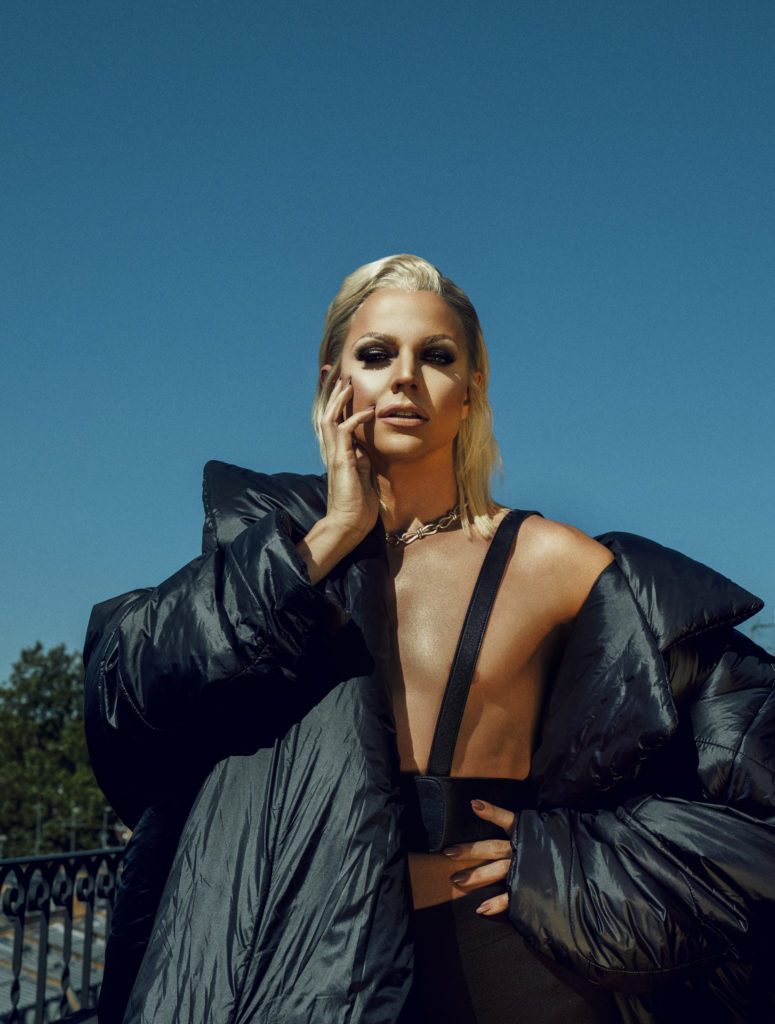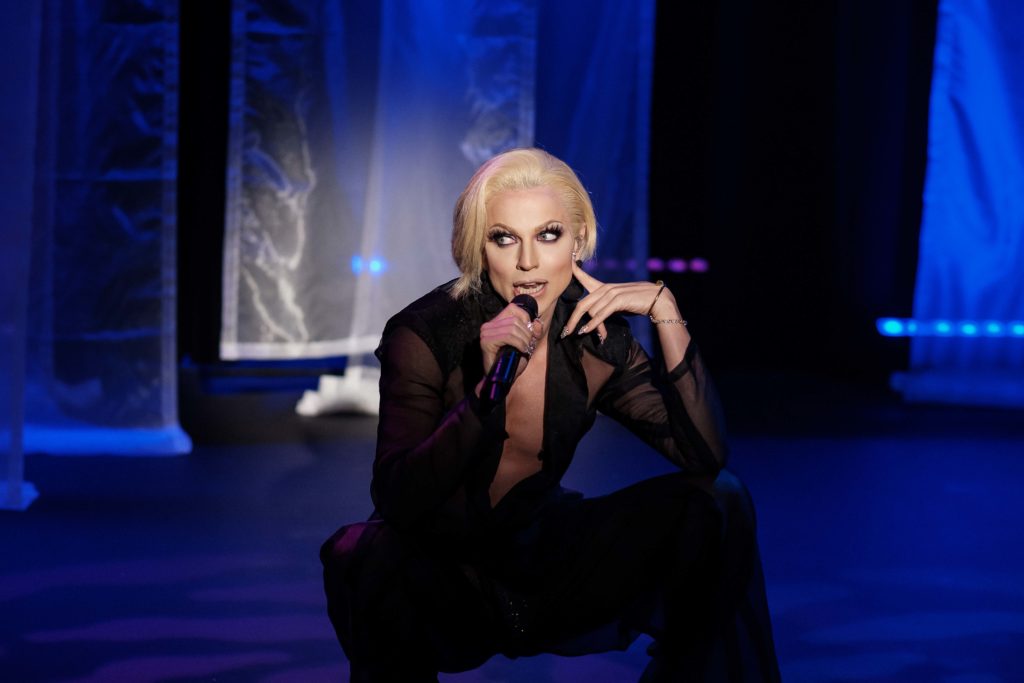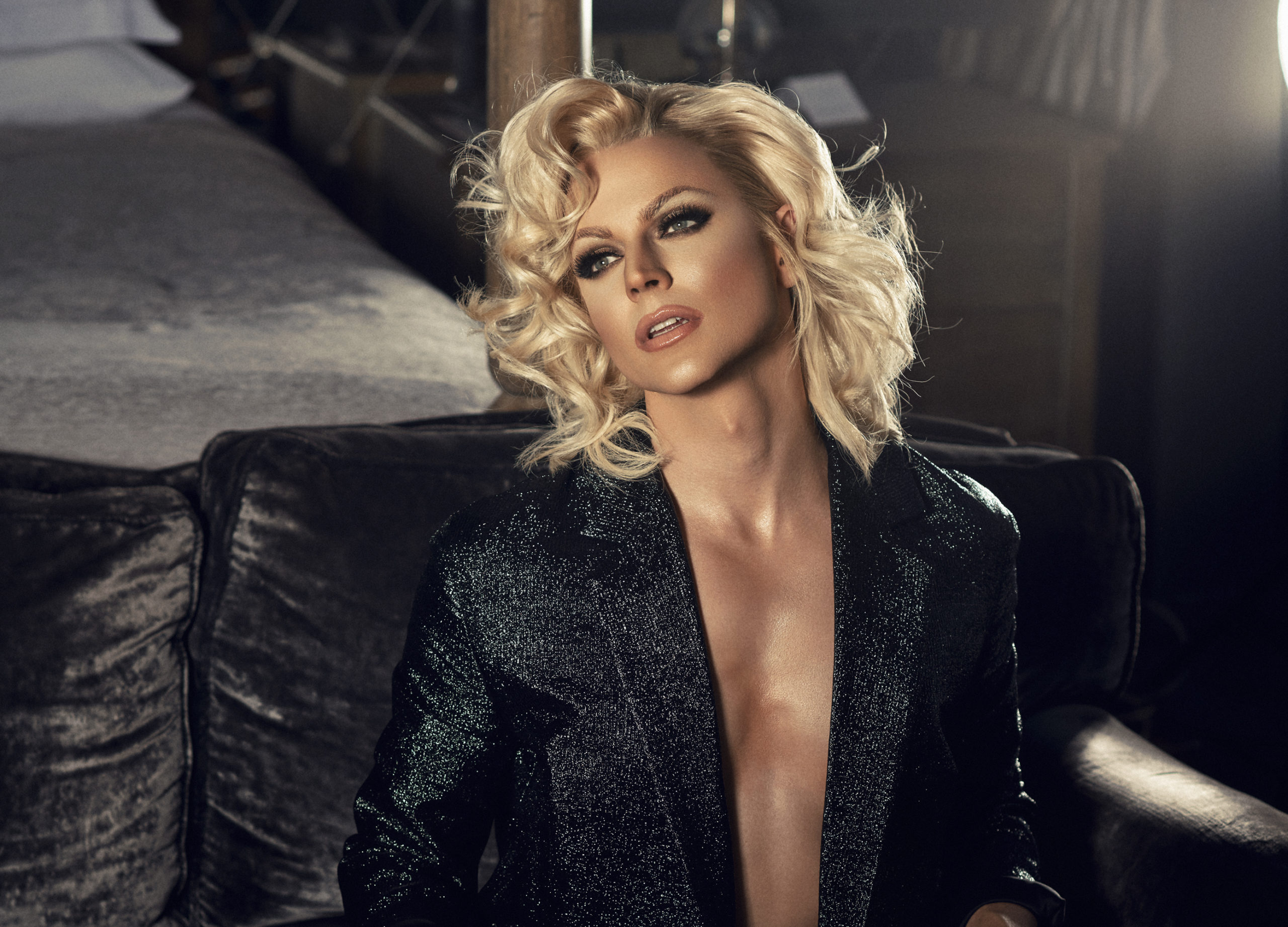Courtney Act is embracing fluidity in all forms. (Joseph Sinclair)
Courtney Act has been guilty of transphobia. Racism too. And she isn’t ashamed to admit it.
“It’s a slow unpacking, understanding that we do have those unconscious biases, understanding that if you let go of them that you might get laid more often,” she tells PinkNews.
She’s not being flippant – rather lightening the mood as we discuss the deep-seated prejudices many of us in the queer community carry, in the people we choose to sleep with, interact with, and accept as part of our own.
It’s the Courtney Act way – approaching the big topics with wit and charm, educating with empathy rather than scorn. It’s what she did on Celebrity Big Brother, when she won the nation’s heart by schooling notoriously anti-LGBT+ politician Ann Widdecombe on queer rights. It’s what she’s been doing for the past few years, opening up to the public about her pansexuality and gender fluidity. And it’s what she’ll do again, fate permitting, when she tours her new cabaret show Fluid, which is all embracing who she is and confronting her own biases head on, as she tells us one hot, humid summer afternoon.
PinkNews: Where are you right now?
Courtney: I’m at home in London. There’s a construction site next door so I’ve had the window closed all day. I’m sat in my underwear, I’ve got a wig on though.
So am I – minus the wig. Anyway, you’ve just announced a new tour, Fluid.
Yes, and I’m super excited. It’s a full cabaret tour of live original music with a band, which is something I’ve never done before. It’s about gender, sexuality and how this concept of fluidity really is a part of everybody’s everyday life, but we maybe don’t always recognise that.
We’ve become so good at polarising the binary – young/old, black/white, fat/thin, gay/straight — even trans/cis, weirdly, have become polarised. Although this is about some really big personal stories about my own struggles with my gender identity, when we did the show in Sydney, at Mardis Gras, even cis straight people would come up and say how universal it felt, how they didn’t realise that all of those impositions and impacts of gender were things that affected them too. I’m all about breaking down the binary!
You talk so confidently on topics of gender and sexuality. How did you get to this place?
It’s been a long journey. I’m 38 now, and I was confused for most of my teens and my 20s which, interestingly, I kind of think is how you’re supposed to be.
I think some of the biggest struggles comes from people thinking that they’re not meant to struggle. I think that if you see it as a struggle then it kind of becomes self-fulfilling. But if you just see your journey unfolding as life, then you get to see it for what it is and not be so attached to some ideal about being resolved or being perfect or being happy. You just get to be whoever you are and you start to realise that some of the confusion can also be some of the beauty.

A lot of the confusion for me came from growing up in a world that didn’t really have many options when it came to sexuality or gender. And it’s just been the last sort of five years, since Laverne Cox was on the cover of Time Magazine really, that I think the conversation has opened up so much.
As someone who always questioned where they fell on the gender spectrum, that conversation gave me space. Having people like Laverne and Janet Mock and Chaz Bono in the public eye gave me these amazing examples of trans people, who were giving such brilliant conversation, that meant I was able to put aside my internalised transphobia about my own identity and link to it, and explore what that actually meant.
I think a lot of queer people, cis and trans, have dealt with that sense of internalised transphobia. How did you go about confronting that?
I also think the way that you unpack and confront your own biases, whether that be race, which is obviously a very relevant one, or whether that be queerness or trans identity is by hearing lots of different stories, is by listening to the stories of different people and fostering empathy. I don’t think a lot of people actually understand what that means, but empathy is listening to somebody else’s story, and not having to try to understand it through your own experience.
For me my gender identity was entangled in my life. Even though I did drag and performed in a very feminine visage, it was something that I always polarised as being a job. I was too transphobic to ever consider if I was trans or not.
It was the first time that I learnt to accept trans identity through someone else’s experience and not my own life.
My friend Chaz Bono and I were talking about gender back in 2013, and he was telling me about his experience. I remember saying to him: “Don’t you just think that sometime in the future, trans people will be so accepted that they’ll be able to just live their lives however they feel and not have to undergo medical or surgical transition?”
And he said: “No, that’s what you think because that’s who you are.”
I don’t have any body dysmorphia or anything like that, but for Chaz his top surgery was an intrinsic part of his identity. It was the first time that I learnt to accept trans identity through someone else’s experience and not my own life. And that was really powerful.
[embedded content]
You mentioned race which is obviously such an important conversation right now. I noticed you’ve been out protesting.
I was in Los Angeles when the protests broke out. Getting to be there, to feel the anger and the pain and the fear – and also the hope – of the Black community was really powerful.
Although it has come to a head now and we’re seeing protests all around the world, we only have to look back to last year when Manchester Pride decided to adopt the queer people of colour flag, and there was a huge stink about it. People never took the time to even listen to what the story was. People were so consumed with their own unconscious racism that they just acted out. They said, ‘You can’t change our flag. This is not right. We don’t like it’.
That was an example of racism in our own community. And I know that sexual racism is a big issue in our community, I know these things because I have been that person. I have talked about coming to be aware of my own racial prejudices and also my own sexually racist prejudices.
I grew up in a society where I was taught to be racist.
I grew up in a society where I was taught to be racist. The media had these narratives and these archetypes of not just black people, but all people of colour, that represented them in unjust and unfair ways. That manipulated and demonised them for political gain. When you are confronted with that it can be easy to say, ‘Oh, I’m not racist’.
But as a white person, I now understand that I was brought up in that world. I don’t blame myself for those those racist feelings that I had, but I do take responsibility for them instantly. It’s not inherently who I am, it was something that I’ve learned and it’s something that I can unlearn, and have and continue to unlearn.
It’s something that white people living in the Western world need to consistently unpack, because there are such prominent hallmarks of racism in the communities that we live in.
Especially in the gay world. I’m Black, and so often I’ve been told “Oh I don’t like Black guys, it’s just my preference”. As a white person, do you think that’s valid? Can you have a preference? Or is it just racism?
I think that people probably haven’t done the work in fully understanding why they think that it’s just their preference.
If we lived in a fair and just society where all people of different skin tones were treated equally, then your preferences would be more valid. But in this society where oppression is systemic and long running, it’s still around today, and we’re brought up with these ideas, you can’t really make those statements without being simply racist.
I think that there’s so much to understand and unpack when it comes to sexual racism in the gay community and the queer community. If you let go of those unconscious biases, you might get laid more often.

I noticed years ago, I would be on Grindr and I just would flip more quickly over profiles of people of colour and I would stay longer on profiles of white people.
That was actually the one of the things that was the trigger for me. I was like, “Oh, did you notice that? Why is that? Am I even able to discern whether I like somebody or not that quickly, or am I just using that entire categorisation of a person to swipe them away?”
As an activity I started to actively stay on – and look, some of this is it’s contrived, because it has to be because you’re trying to counteract systems – but I’d be like, “OK, let me just stay on these profiles of people of colour a little bit longer. What do I think? Do I feel attracted? What’s going on when I look at this Black guy or that Asian guy? Does it turn me on, am I turned on by him?”
This is weird because it’s sort of like meditation on Grindr – but if you can, rather than just reacting, rather than just saying yes or no to each photo, take a moment and try, as you see the photograph, to feel what happens in your body. What sensations come up in your body? Are there any memories or thoughts or ideas?
That little act opened my world exponentially.
That’s brilliant. You could apply that to so many things, to how we judge people for the way they present in their gender, whether they’re femme or butch, cis or trans or non-binary.
A lot of the men I sleep with are straight identifying, I often sleep with them as Courtney. By the way I’m not just into straight guys, I’m an equal opportunist – but I wondered why there was that interest in the unobtainable.
Is it just that you want what you can’t have? I examined it and I realised that my sexuality began in puberty, in high school, and I was attracted to the boys who were around me at school. All of them, ostensibly, were straight, so of course, I couldn’t express that attraction to them.
And I would pine away for these boys, who were never going to love me back because I couldn’t even articulate what I was feeling to them, because I was so unaware of what being queer even was, and they were all straight.
That was where my sexuality began, and that’s when my sexuality was stunted, because it wasn’t able to grow beyond that idea of being attracted to these guys who were straight and were never going to love me back.
Even observing that is such a powerful moment. I’m writing my memoir and it has been really powerful. I’m unpacking a lot of formative experiences.
Courtney Act’s Fluid will play in the UK and Europe in April 2021. Tickets are on sale now.
